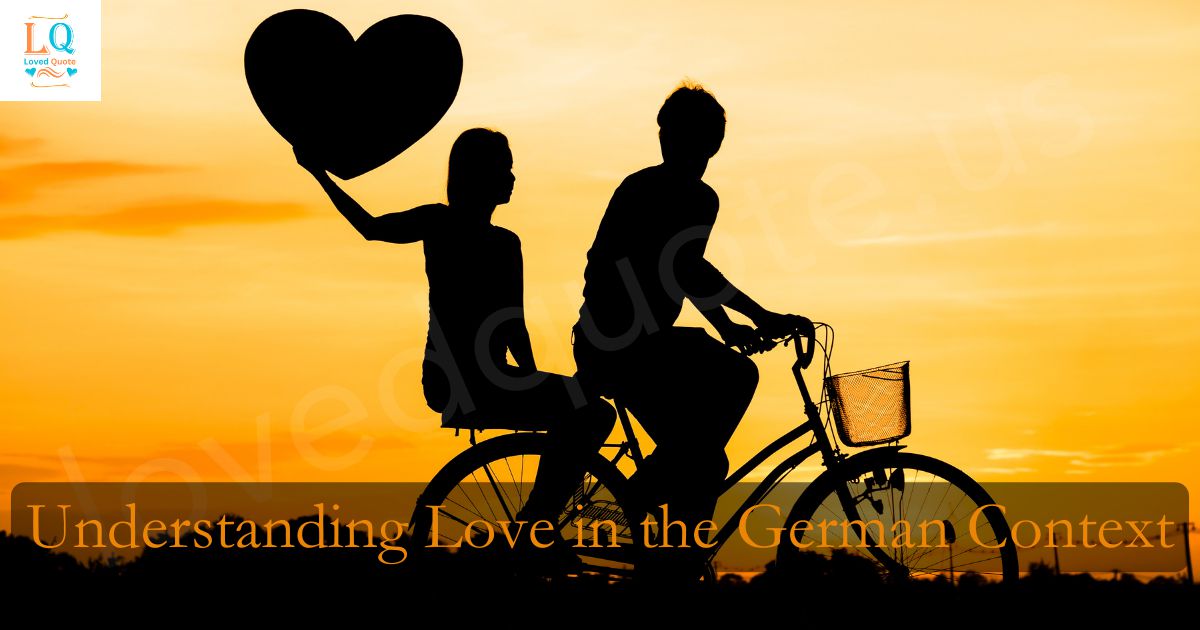What better way to show your passion than to study those three enchanted words in many languages? The wonderful world of language makes expressing love a fun adventure. Listen up, romantic language learners! You’re about to go on a linguistic trip that will add “I love you” to your repertoire in German. When it comes to personal affairs, the German language, with its rich history and precise phrasing, has a special allure.
Immerse yourself in the cultural meaning of these phrases as we delve into the complexities of German love expressions. This book will provide us with a linguistic doorway to expand your connections. Discover the lovely skill of saying “I love you” in this mesmerizing language as we delve into the beauty of German endearments.
“Ich Liebe Dich” in German

1. “Ich Liebe Dich” Revealed: The Impact of Just Three Words
As far as German love songs go, “Ich Liebe Dich” is the prototypical three that captures the essence of the sentiment. The three words have great meaning when translated to “I love you,” and they are a worldwide symbol of love and connection.
2. Linguistic Melody: Dissecting “Ich Liebe Dich”
Let’s analyze this German phrase for its elegant language use. A personal proclamation is put in motion by the phrase “Ich,” meaning “I,” and then by the word “Liebe,” meaning “love,” which resounds with a gentle and kind quality. The statement is completed by the union of “Dich,” which means “you,” creating a beautiful declaration that unites people of different cultures.
3. Cultural Significance: The German Context of “Ich Liebe Dich”
In German, there are more nuanced ways to convey affection than just words. The depth and honesty it conveys show how much the Germans value authentic feelings. Saying “Ich Liebe Dich” in a culturally appropriate way strengthens the bond between people and makes the gesture more meaningful.
4. Exploring the Deep Emotional Meaning of “Ich Liebe Dich”
Although translation helps bridge language barriers, the profound emotional impact of “Ich Liebe Dich” goes beyond mere words. Embedded in it are the qualities of openness, trust, and a common path. The significant impact these three words may have on relationships can be revealed by exploring their emotional depths.
Learning the German phrase “Ich Liebe Dich” is more than just a language exercise; it’s a sincere way to show respect for the significance of love in German culture.
The Poetry Behind Love Expressions
- Creating Love Poems: A Craftsman’s Guide
Love, a timeless inspiration for poets, is beautifully captured in the art of love words. These expressions transform into beautiful poetry, blending feelings into a beautiful Tapestry of love. - Two, Love as a Symphony: How Emotions and Words Harmonize
Words play an orchestra in the world of love, with each phrase adding its own special blend of ardor and vulnerability. Delving into the lyrical aspect of love declarations enables us to comprehend the symphonic magnificence underlying the monolithic “I love you.” - Going Above and Beyond: Converting Words into Poetry
Love has a magical way of turning everyday speech into beautiful poetry. “Ich Liebe Dich” is a beautiful love expression in German that takes a simple declaration and turns it into a poetic journey, making it into an art form. - Cultural Cadence: The Way Love Poems Are Depicted in Different Languages
The poetry of love expressions is enriched by the particular rhythm of every language. Exploring varied linguistic variations reveals the complex tapestry of emotions woven throughout each culture’s representation of love, whether it’s the melodic flow of Italian or the organized grace of German.
When we delve into the poetic underpinnings of love declarations, we find that love is more than simply words; it is a piece of art in and of itself. Love, seen through this poetic prism, becomes a heart language, articulated with the elegance and beauty of poetry that surpasses the language barrier.
How to Convey Affection in the German Language
- First Things First: Become an Expert on Common Terms of Endearment
I recommend starting with the more basic words and phrases like “Liebling” (love), “Schatz” (treasure), and “Süße/Süßer” (sweetie). These are common ways that Germans show their love for one another. - Embrace “Ich Liebe Dich”: The Pinnacle of Love Proclamation
Recognize the weight of “Ich Liebe Dich,” the clear expression of “I love you.” It represents a profound and dedicated emotional bond, transcending just casual endearments. - Convey Your Admiration: Offer Heartfelt Compliments
Honesty is highly esteemed in German society. Kind, heartfelt compliments like “Du bist wunderschön” or “Du machst mich glücklich” can go a long way toward lifting a loved one’s spirits. - Nonverbal Communication: Hand motions Raised Voices
Embrace the power of non-verbal gestures like holding hands, kissing, and embracing. In German partnerships, physical touch is a crucial component of showing affection. - Enjoy Each Other’s Company: Celebrate Memories Together
Make cherished memories by commemorating special events as a family. Celebrated together, whether it’s a cultural festival, a birthday, or an anniversary, strengthens your bond. - Express Your Feelings in Writing: Love Letters
Politeness is highly valued among Germans. Love letters and notes are a great way to put your emotions into writing and demonstrate your affection with thoughtful language. - Discover Love Phrases: Bring Laughter to Expressions
For an interesting twist, try looking for some humorous German love phrases, such as “Schmetterlinge im Bauch haben” (to have butterflies in the stomach). Expressing your affection with idioms brings a fascinating and culturally relevant element to your words.
Encourage Balance by Respecting Personal Space Personal Freedom and Community Uniqueness is highly prized in Germany. Always remember to give each other space and be respectful of their independence, even as you stay close.
Understanding Love in the German Context

1. German Love: Tradition and Modernity
Explore the German love philosophy, where tradition and modernity blend. Understanding love in Germany requires recognizing a dynamic mix of historical and modern elements.
2. The Value of Genuine Connection: Beyond Surface Gestures
Germans value genuineness in love. Emotional connection trumps superficial gestures. Discover how love requires depth and authenticity.
3. Partnerships: Shared Duties and Bonds
Partnerships are common in German relationships. Love includes shared duties, support, and decision-making, not just romance. Explore the unique dynamics of German love as a partnership.
4. German Independence-Togetherness Balance
The German love philosophy encourages independence and connection. Discover how people balance personal space and a strong, interwoven relationship while maintaining their autonomy.
5. Celebrating Milestones: German Love Rituals
Milestones and rituals matter in German partnerships. Anniversary celebrations and cultural traditions are symbols of love. Discover how such events enrich German love stories.
6. Directness and Openness in Love Discourse
Germans are famed for their direct communication, including love. Explore how directness and openness in love speech can develop and maintain meaningful connections.
Understanding love in Germany requires cultural awareness, shared obligations, and authenticity. It’s a story that weaves German traditions and modern principles into Genuine partnerships.
FAQ’s
Conclusion:
We have deciphered the cultural complexities that form romantic connections and shown the splendor behind the saying “Ich Liebe Dich” as we conclude our investigation of German love expressions. German romanticism places an emphasis on authenticity, collaboration, and a harmony between autonomy and closeness, from subtleties of language to the importance of true feelings. In Germany, love is a beautiful fusion of old and new, marked by joint duties and significant life achievements.
As we explore the cultural rhythms and lyrical landscapes of love expressions, it becomes clear that language is more than just a means of communication; it is a vehicle for strengthening bonds of emotion. The process of showing love in German, whether through words, gestures, or shared memories, goes across language barriers and resonates as a worldwide declaration of affection & connection. We hope that this journey deepens our awareness of the language for the heart and encourages us to treasure and express love in varied ways.
More Related:
